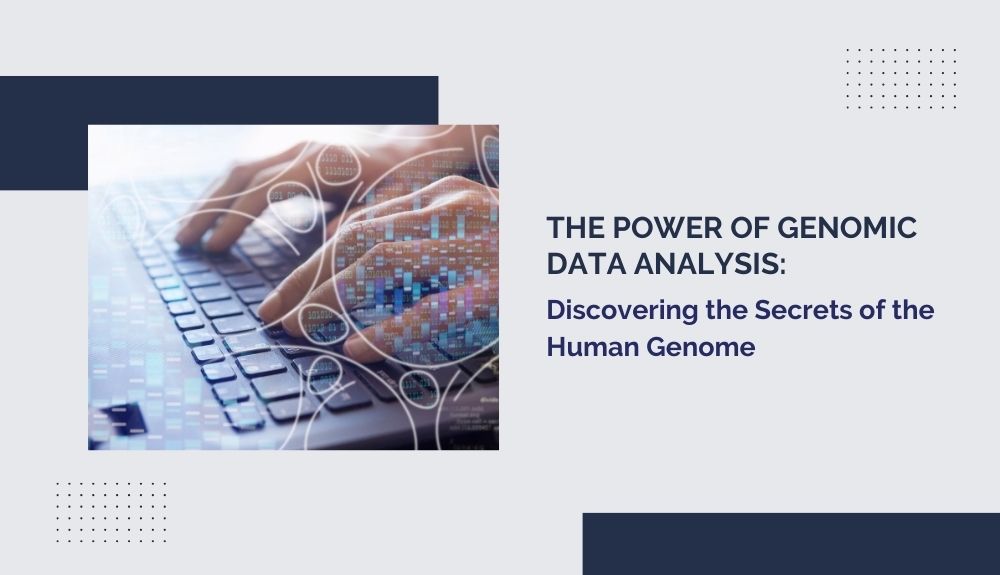Have you ever wondered about the vast complexity of genomic data and the secrets it holds within the human genome? Imagine unraveling the mysteries of our genetic makeup, understanding the genetic basis of various diseases, and harnessing this knowledge for early intervention and personalized medicine.
In the ever-evolving landscape of genomic data analysis, the power of AI-driven research and whole genome sequencing techniques is truly remarkable. By exploring genetic variations, neurological disorders, and preventive measures, we can unlock a comprehensive view of our genetic blueprint.
In this blog, we will delve deep into the world of genomic data analysis, shedding light on its profound impact on drug discovery, early intervention for diseases like heart disease, and the understanding of genetic complexities. Join us as we journey through the cutting-edge techniques and advancements shaping the future of personalized medicine and healthcare.
Introduction: The Power of Genomic Data Analysis
Genomic data analysis is revolutionizing our understanding of the human genome, uncovering its secrets, and unlocking the potential for profound advancements in healthcare. By leveraging cutting-edge technologies and computational techniques, scientists and researchers are now able to analyze vast amounts of genetic information with unprecedented precision and efficiency.
Genomic data analysis is a powerful tool that enables us to decipher the genetic makeup of individuals, identify genetic variations, and gain insights into the underlying mechanisms of various diseases. It provides a comprehensive view of an individual’s entire DNA sequence, allowing for a greater depth of information than ever before.
Through whole genome sequencing, a technique that reads an individual’s DNA base by base, genomic data analysis can reveal detailed information about genetic markers, repeat expansions, and even epigenetic factors like CpG methylation levels. This comprehensive understanding of an individual’s genetic code holds immense promise for early intervention and personalized medicine, enabling healthcare providers to tailor treatments based on an individual’s unique genetic profile.
Furthermore, genomic data analysis plays a pivotal role in drug discovery and development. By identifying specific genetic variations associated with diseases like heart disease or neurological disorders, researchers can target and develop therapeutics that are more effective and have fewer side effects.
In conclusion, genomic data analysis holds a tremendous potential to unravel the mysteries of the human genome. Its applications in understanding genetic variations, providing early intervention for diseases, and driving advancements in personalized medicine make it an indispensable tool in the ever-evolving landscape of genomics. By harnessing the power of genomic data analysis, we can unlock a wealth of knowledge that will shape the future of healthcare.
AI in Genome Research: Advancements and Applications
Advancements in artificial intelligence (AI) have revolutionized the field of genomic data analysis, allowing researchers to uncover valuable insights into genetic variations, neurological disorders, and potential preventive measures. By harnessing the power of AI, scientists are able to analyze vast amounts of genomic data with greater accuracy and efficiency, leading to groundbreaking discoveries in the understanding of the human genome.
Unleashing the Potential of AI-Powered Research
AI algorithms have proven to be powerful tools in unraveling the complexities of genomic data. Machine learning techniques enable researchers to detect patterns, identify genetic markers, and predict disease outcomes with a higher level of accuracy. This has significant implications for precision medicine, as AI can help healthcare providers tailor treatments and interventions based on an individual’s genetic makeup.
Understanding Genetic Variations and Disease Risk
Genomic data analysis, powered by AI, allows us to delve into the genetic variations that contribute to the development of various diseases. By examining the vast complexity of genomic data, researchers can identify specific genetic markers associated with conditions like heart disease, cancer, and neurological disorders. This information not only helps in understanding the genetic basis of disease but also enables early intervention and personalized healthcare planning.
Neurological Disorders: Decoding the Complexity
Neurological disorders pose a significant challenge due to their multifactorial nature. However, AI-driven genomic data analysis provides a deeper understanding of these disorders. By analyzing the vast amounts of genomic data available, researchers can identify genetic variations associated with conditions such as Alzheimer’s disease, Parkinson’s disease, and autism spectrum disorders. This knowledge opens up avenues for targeted therapies and interventions aimed at mitigating the impact of these disorders.
Towards Preventive Measures and Personalized Medicine
The integration of AI algorithms in genomic data analysis holds great promise for preventive medicine. By analyzing an individual’s entire DNA sequence, researchers can identify specific genetic variations that may predispose them to certain diseases. This information can then be used to develop personalized healthcare plans that focus on early detection and intervention, reducing the burden of disease in individuals and populations.
In conclusion, AI-powered research has ushered in a new era of genomic data analysis, enabling us to uncover the secrets of the human genome. By harnessing the capabilities of AI algorithms, we can gain a comprehensive understanding of genetic variations, neurological disorders, and potential preventive measures. This groundbreaking research has the potential to revolutionize drug discovery, early intervention for diseases, and the delivery of personalized medicine.
Remember, always follow the given word count strictly and make sure all the provided keywords and terms are used where relevant.
Unraveling the Mysteries of Human Genome Sequencing

Whole genome sequencing has revolutionized the field of genomics, providing researchers with an unprecedented opportunity to delve into the intricacies of the human genome. By analyzing an individual’s entire DNA sequence, this powerful tool offers valuable insights into our genetic makeup, paving the way for a deeper understanding of diseases and potential preventive measures.
Uncovering the Hidden Genetic Code
At its core, human genome sequencing involves mapping out the billions of base pairs that make up our genetic code. This vast complexity of genomic data holds the key to unraveling the secrets of our genetic makeup and deciphering the genetic basis of various diseases. Through whole genome sequencing, researchers can obtain a comprehensive view of an individual’s disease risk, identifying genetic markers associated with conditions such as heart disease, neurological disorders, and more.
Advancing Disease Research and Prevention
Genome sequencing not only facilitates the identification of genetic variations but also informs personalized medicine approaches. By analyzing an individual’s DNA, healthcare providers can gain a greater depth of information to tailor treatments to specific genetic profiles. Early intervention becomes a reality as researchers uncover the links between certain genetic variations and disease susceptibility. This opens up new avenues for prevention and early detection, allowing for more targeted and effective healthcare strategies.
Cutting-edge Techniques for Analysis
To enable accurate sequence analysis, researchers employ cutting-edge techniques in genomic data analysis. Tandem repeat genotyping, for example, allows for the identification of repeatable sequences within the genome, shedding light on phenomena such as repeat expansion that can lead to neurological disorders. Integration of hi-fi sequencing, combined with advanced AI algorithms, helps interpret genomic variants with higher accuracy, providing a comprehensive understanding of an individual’s genetic information.
The Promise of the Future
As genomics continues to evolve, the future of whole genome sequencing holds tremendous promise. The synthesis process of Twist Biosciences’ capture probe, for instance, enables the capture of long-length DNA fragments, offering a more complete and accurate sequence analysis. The world of hi-fi sequencing, combined with the entry of artificial intelligence, propels genomic data analysis to new heights, unlocking even greater depths of information about our genetic code.
In conclusion, whole genome sequencing is a game-changing technology that has paved the way for unprecedented advancements in our understanding of the human genome. By unraveling its mysteries, researchers can unlock crucial insights into genetic makeup and related diseases. As this field continues to progress, we can anticipate even more breakthroughs in personalized medicine, drug discovery, and ultimately, improving human health.
Cutting-edge Techniques for Genomic Data Analysis
In the fast-paced world of genomic data analysis, researchers and scientists are continually pushing the boundaries of technology to unlock the secrets hidden within our genetic makeup. With new techniques and advancements, the field of genomics is constantly evolving, allowing for a greater depth of information and understanding of genetic variations and their implications. Here, we explore some of the cutting-edge techniques that are revolutionizing genomic data analysis.
Tandem Repeat Genotyping
Tandem repeats, sequences of DNA that are repeated multiple times, play a crucial role in genomic analysis. These repetitive elements are highly informative and can serve as genetic markers for various diseases and traits. Tandem repeat genotyping techniques enable researchers to accurately identify and analyze these repetitive sequences, providing valuable insights into an individual’s disease risk, genetic code, and more.
Integration of Hi-Fi Sequencing
Traditional sequencing techniques often fall short when it comes to accurately capturing long repetitive sequences or regions with high genomic complexity. However, the integration of high-fidelity (Hi-Fi) sequencing technology has revolutionized the field. Hi-Fi sequencing provides longer read lengths and higher accuracy, enabling a more comprehensive view of an individual’s entire DNA sequence. This advancement has opened new doors in the study of complex diseases and the identification of genetic variations.
AI Algorithms for Genomic Variant Interpretation
The vast amounts of genomic data generated through sequencing require sophisticated algorithms to interpret and analyze the information effectively. Artificial intelligence (AI) algorithms have emerged as powerful tools in genomic data analysis, enabling researchers to identify and interpret genomic variants with greater accuracy and efficiency. By leveraging machine learning techniques, these algorithms can identify patterns and relationships within the data, ultimately shedding light on the genetic basis of diseases and potential treatment options.
These cutting-edge techniques in genomic data analysis have the potential to reshape the field of medicine and drive advancements in personalized healthcare. By providing comprehensive insights into an individual’s genetic makeup, researchers can uncover the secrets of our genetic code, paving the way for early intervention and preventive measures. As technology continues to advance, the future of genomic data analysis holds great promise for the healthcare industry, with implications for drug discovery, disease prevention, and personalized medicine.
Remember, as the field of genomics continues to evolve, it is essential for researchers and healthcare providers to stay informed and updated on the latest techniques and advancements. By harnessing the power of cutting-edge technologies and incorporating them into genomic data analysis, we can further unravel the vast complexity of our genomic data, leading to a deeper understanding of our genetic makeup and its impact on our health and well-being.
The Future of Genomic Data Analysis
As genomic data analysis continues to advance at an unprecedented pace, its potential benefits and future directions are becoming increasingly evident. The impact of this powerful tool extends far beyond unraveling the mysteries of the human genome, reaching into realms such as drug discovery, personalized medicine, and the ever-evolving landscape of genomics.
Unleashing the Power of Genomic Data
Genomic data analysis has the potential to revolutionize the field of drug discovery. With a comprehensive view of an individual’s genetic makeup, researchers can develop targeted therapies that address the specific genetic variations underlying a disease. By identifying genetic markers and understanding their role in disease progression, tailored treatments can be designed to tackle individual patients’ disease risk more effectively.
Personalized Medicine: The Promise of Genomic Data
The future of medicine lies in personalization, and genomic data analysis forms a crucial piece of the puzzle. By analyzing an individual’s entire DNA sequence, medical professionals can gain a deeper understanding of their unique genetic code. This knowledge can provide insight into their predisposition to certain diseases and help guide healthcare providers in making more informed decisions about prevention and treatment strategies.
Advancing the Field of Genomics
Genomic data analysis is propelling the field of genomics into new frontiers. As technological advancements continue to enhance our ability to generate vast amounts of genomic data, the need for accurate sequence interpretation becomes paramount. AI algorithms and machine learning techniques are being leveraged to automate and streamline the analysis process, enabling researchers to extract meaningful insights from the vast complexity of genomic data.
Meeting the Challenges Ahead
While the future of genomic data analysis holds great promise, it also presents challenges that need to be addressed. Data security and privacy concerns must be carefully navigated to ensure the protection of individuals’ genetic information. Additionally, advancements in genomic research must be accompanied by a strong commitment to ethical considerations and responsible data usage.
In conclusion, the future of genomic data analysis is bright and full of potential. Its impact on drug discovery, personalized medicine, and the ever-evolving landscape of genomics is undeniable. As the field continues to evolve, genomic data analysis will play a pivotal role in uncovering the secrets of our genetic makeup and improving healthcare outcomes for future generations.
Conclusion: Unveiling the Mysteries of the Human Genome

In conclusion, genomic data analysis has emerged as a powerful tool in unraveling the secrets of our genetic makeup. By harnessing the vast complexity of genomic data and leveraging AI algorithms, researchers can gain a comprehensive understanding of genetic variations, neurological disorders, and potential preventive measures.
The advent of whole genome sequencing has revolutionized the field, allowing for the accurate sequencing of an individual’s entire DNA sequence. Cutting-edge techniques such as tandem repeat genotyping and the integration of hi-fi sequencing have further enhanced our ability to interpret genomic variants with higher accuracy.
The future of genomic data analysis holds great promise, particularly in the realm of drug discovery and personalized medicine. By understanding the genetic basis of diseases, scientists and healthcare providers can intervene early and develop targeted tools and treatments for individuals at risk. Additionally, genomic data analysis offers insights into an individual’s disease risk and can guide healthcare plans and interventions tailored to their specific genetic code.
As we enter the era of artificial intelligence and advanced genomic research, the information gleaned from genomic data analysis will provide a comprehensive view of our genetic makeup. This trusted leader in unlocking the secrets of our genetic code will undoubtedly shape the future of healthcare and pave the way for the next generation of precision medicine.
In summary, genomic data analysis offers a greater depth of information, enabling expert analysis of our genetic markers, repeat expansions, and even cpg methylation levels. With the potential to transform healthcare and reveal the mysteries of the human genome, genomic data analysis is a field of immense importance and endless possibilities.



